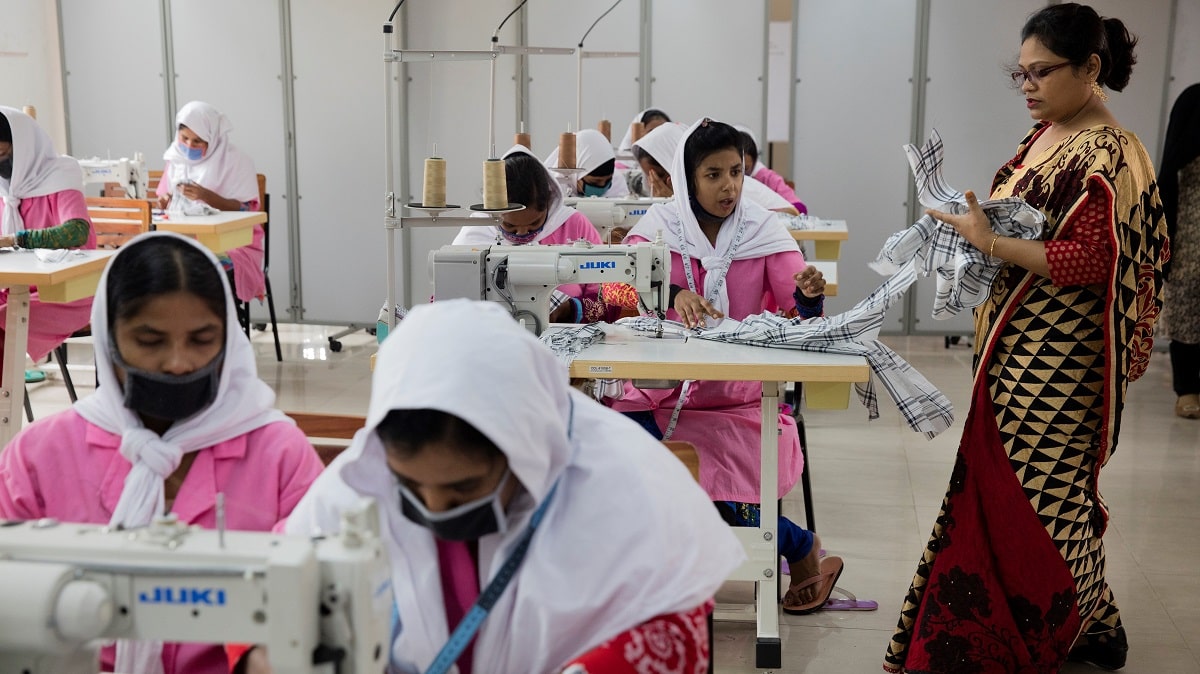
Category: General
Country: Albania
Young women being trained to make shirts in Dhaka, Bangladesh. © World Bank/Dominic Chavez
03 February 2022
Graduation presents an opportunity for the countries to develop strategies that can position the textile and clothing sector higher up the global value chain.
Asian countries graduating from the least developed countries (LDCs) category need to take measures to bolster the textile and clothing sector as they graduate from this category, particularly in response to the economic impact of COVID-19, recommends a joint report by the World Trade Organization (WTO) and three UN bodies.
The report entitled “The Textile and Clothing Sector in Asian Graduating Least Developed Countries: Challenges and Ways Forward” and published on 1 February focuses on countries such as Bangladesh, Lao People’s Democratic Republic and Nepal, where the textile and clothing (T&C) sector is a major industry and will be significantly impacted by graduation.
“This timely study highlights the distinct patterns of insertion of graduating LDCs into the textile and clothing global value chains and discusses how LDC graduation may affect related outcomes, said Rolf Traeger, chief of the LDC section at UNCTAD.
“Given the level of competitiveness of the garment industry, the prospect of losing preferential market access makes the imperatives of diversification and development of productive capacities is critical as ever for graduating LDCs. Hence the importance of their implementing effective industrial policies,” he said.
Support measures benefit sector
LDC support measures offered by international development and trade partners have benefitted the T&C sector. Adjustments to these measures is part of the graduation process and will need to be managed to ensure a smooth transition for the countries overall, the report finds.
“The exports of textiles and clothing of graduating LDCs have largely been driven by LDC trade preferences. Examining the impacts of graduation for this sector is crucial for these countries to adapt to the new trading conditions. This collaboration is a unique effort of UN agencies and WTO to shed light on ways to fully realize the potential of this sector,” said Taufiqur Rahman, head of the LDC unit at the WTO.
Combined T&C exports from LDCs in Asia account for 8% of the global total, which contracted in 2020 due to the pandemic. The sector is an important source of employment, especially for women.
Graduation offers an opportunity
The report notes that graduation presents an opportunity for the countries to develop strategies that can position the sector higher up the global value chain.
Manufacturers consulted for the report said they expected graduation to impact their export performance. In addition to facing higher tariffs, most garment manufacturers rely heavily on imported textiles and will struggle to meet more restrictive rules of origin criteria after graduation.
Many said they don’t have a response plan yet for LDC graduation and are focusing on addressing the impact of the pandemic.
“This timely report sets out important preparatory measures to protect and strengthen the textile and clothing sector, the lifeblood of many LDCs in Asia, during and after graduation,” said Roland Mollerus, secretary of the Committee for Development Policy.
“It provides some country-specific insights and serves as a valuable resource for countries and development partners to work together to chart a steady course for a smooth transition from LDC status and to reach critical targets in the final Decade of Action for the 2030 Agenda.”
How graduation will affect sourcing
Many major clothing brands and retailers consulted for the report believe that LDC graduation will only modestly affect their sourcing and are planning to expand sourcing from graduating LDCs over the next three to five years.
Factors such as workplace safety, working conditions, environmental compliance, innovation and speed to market are increasingly becoming major factors for brands in their long-term sourcing.
“We have consulted many brands and retailers on their future sourcing plans and how it affects graduating LDCs. What we have found is that major buyers are consolidating their sourcing portfolio and, increasingly, they are seeking to source from larger, often multinational apparel manufacturers,” said Matthias Knappe, programme manager, fibres, textiles and clothing at the International Trade Centre (ITC).
“This poses a challenge to many apparel-producing SMEs in LDCs. Together with our partners, we hope to provide support for these small businesses, boost their competitiveness, and overcome this challenge,” he said.
The report was produced by the WTO, the UN Department of Economic and Social Affairs, ITC and UNCTAD, bringing together different areas of expertise on LDC graduation and the T&C sector.
Courtesy: https://unctad.org/news/strengthening-garment-industry-vital-least-developed-countries-asia-graduating-category
Copyrights © 2025 GLOBAL TEXTILE SOURCE. All rights reserved.